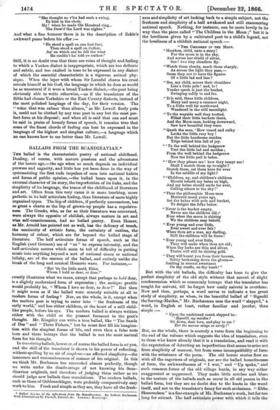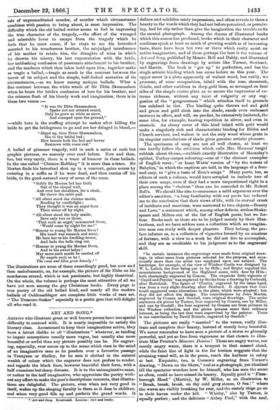BALLADS FROM THE SCANDINAVIAN.*
TILE ballad is the characteristic poetry of national childhood. Dealing, of course, with mature passions and the adventures of the heroic age,—the age when so much depends on individual prowess and sagacity, and little has yet been done in the way of systematizing the first rude impulses of men into national habits and forms of public opinion,—the ballad bears upon it, in the external character of its story, the imperfection of its links, and the simplicity of its language, the traces of the childhood of literature and art. Often from this very cause it is more touching, more pathetic in its half articulate feeling, than literature of more highly organized types. The lisp of children, if perfectly unconscious, has as great a charm as the lisp of grown-up people has a repulsive- ness. The Greeks, who, as far as their literature was concerned, were always the opposite of childish, always mature in art and wise self-consciousness, had no ballad poetry. Even Homer, as Mr. Arnold has pointed out so well, has the delicacy of touch, the continuity of artistic form, the certainty of outline, the harmony of colour, which are far beyond the ballad stage of literature. The half articulate forms of speech, such as the English (and German) use of " so " to express intensity, and the half-articulate metres which seem to tell of difficulty in putting music into anything beyond a sort of national croon or national lullaby, are of the essence of the ballad, and entirely unlike the break of the long and musical Homeric wave. For instance,— "But 'tis t'he little maid, Eline,
Whom I hold so dear, so dear !"
exactly illustrates what we mean, except that perhaps to hold dear, is a slightly modernized form of expression ; the antique prattle would probably be, " Whom I love so dear, so dear 1" But then it might seem as if the ballad were scarcely suitable at all to modern forms of feeling? Nor, on the whole, is it, except when the modern poet is trying to enter into " the freshness of the early world," and has either children, or the heart of a still child- like people, before his eye. The modern ballad is always written either with the child or the peasant foremost in the poet's thought. Mr. Kingsley can write a true ballad, like " The Sands of Dee " and " Three Fishers," but he must first fill his imagina- tion with the simplest forms of life, and even then a false note here and there betrays that the ballad is not the most natural form for his thought.
In translating ballads, however, of course the ballad form is set you, and the skill of the translator is shown in his power of reflecting, without spoiling by an air of simplesse—an affected simplicity—the innocence and unconsciousness of manner of his original. In this we think Mr. Buchanan has succeeded almost perfectly, though we write under the disadvantage of not knowing his Scan- dinavian originals, and therefore of judging them rather as we should judge new ballads than translations. The modern ballads, such as those of Oehlenschlager, were probably comparatively easy work to him. Fresh and simple as they are, they have all the fresh- • Ballad Stories of the Affections from the Scandination. By Robert Buchanan. With Illustrations by Pitmen, Dalziel, $c. London: Routledge.
ness and simplicity of art looking back to a simple subject, not the freshness and simplicity of a half awakened and still stammering national speech. Nothing, for instance, can be more lovely in its way than the piece called " The Children in the Moon ;" but it is the loveliness given by a cultivated poet to a child's legend, not the loveliness of a childish national speech :—
"THE CHILDREN IN THE Moos.
"Hearken, child, unto a story! For the moon is in the sky, And across her shield of silver, See ! two tiny cloadlets "Watch them closely, mark them sharply, As across the light they pass,— Seem they not to have the figures Of a little lad and lass ?
" See, my child, across their shoulders Lies a little pole ! and, 101 Yonder speck is just the bucket, Swinging softly to and fro.
"It is said, these little children, Many and many a summer night, To a little well far northward Wandered in the still moonlight.
" To the wayside well they trotted, Filled their little buckets there, And the Moon-man, looking downward, Saw how beautiful they were.
" Qaoth the man, 'How vexed and sulky Looks the little rosy boy ! But the little handsome maiden Trips behind him full of joy.
" To the well behind the hedgerow Trot the little lad and maiden ; From the well behind the hedgerow Now the little pail is laden.
"'How they please me ! how they tempt me ! Shall I snatch them up to-night ? Snatch them, set them here for ever In the middle of my light?
"'Children, ay, and children's children Should behold my babes on high, And my babes should smile for ever, Calling others to the sky!'
"Thus the philosophic Moon-man Muttered many years ago, Set the babes with pole and bucket, To delight the folks below.
"Never is the bucket empty, Never are the children old ;' Ever when the moon is shining We the children may behold.
" Ever young and ever little, Ever sweet and ever fair !
When thou art a man, my darling, Still the children will be there !
"Ever young and ever little, They will smile when thou art old; When thy looks are thin and silver, Theirs will still be shining gold.
" They will haunt you from their heaven, Softly beckoning down the gloom— Smiling in eternal sweetness On thy cradle, on thy tomb!"
But with the Sold ballads, the difficulty has been to give the perfect simplicity of the old style without that accent of slight condescension which so commonly betrays that the translator has sought for naivete, till he forgot how easily naivete is overdone. Now and then, perhaps, a word serves to indicate a too great study of simplicity, as when, in the beautiful ballad of " Signelil the Serving-Maiden," Mr. Buchannan uses the word " slapped," a word, in English at least, rather familiar and jocular, than simple :—
" Upon the cushioned couch slapped ho : Signelil, my maiden !
Sit down, dear love, and play to me 1' But the sorrow stings so sorely!"
But, on the whole, there is scarcely a verse from the beginning to the end of the volume which suggests the idea of translation, even to those who know already that it is a translation, and read it with the expectation of detecting an imperfection that seems to arise not from simplicity of manner, but from some incompatibility of form with the substance of the poem. The old heroic stories flow on with all the eagerness of originals, nor are the ballad homelinesses of form, the awkwardnesses of " I wot," and " Up spake," and such common forms of the old village bards, in any way either exaggerated or suppressed. They make little notches and blurs in the texture of the ballads such as occur in all old poems in the ballad form, but they are no doubt due to the knots in the wood itself, and not to the translator's fancy for such archaisms. " Ebbe Skammelson" is a fine example of Mr. Buchanan's work, but far too long for extract. The half articulate power with which it tells the tale of unpremeditated murder, of murder which circumstance combines with passion to bring about, is most impressive. The difficulty which the old ballad-writer seems to feel in impressing the true character of the tragedy,—the effort of the wronged and miserable lover to escape from the tragedy which he feels that he must cause, if he stays to see his betrothed married to his treacherous brother, the misjudged interference of his mother to retain him, the draughts of wine in which he drowns his misery, his last expostulation with the bride, her unblushing confession of passionate attachment to his brother, and the madness which then takes hold upon him, together make as tragic a ballad,—tragic as much in the contrast between the terror of its subject and the simple, half-linked narrative of its circumstances,—as we know among antique ballads. What a fine contrast between the white wrath of Sir Ebbe Skammelson when he hears the bride's confession of love for his brother, and the crimson flush of his bloody work and imagination, there is in these two verses :- "It was Sir Ebbe Skammelson Spake not nor uttered sound, Only he grew as white as snow, And stamped upon the ground,"
—while here is the scoffing attempt he makes after killing the bride to get the bridegroom to go and see her deluged in blood,—
" Stand up, thou Peter Skammelson, Hie to thy bridal bed
How bonnie look the bed and bower Bestrewn with roses red."
A ballad of grimmer tragedy, told in such a series of rude but graphic pictures, we scarcely ever read before. Now and then, too, but very rarely, there is a trace of humour in these ballads. In the one called "Cloister-Robbing" it is more than a trace. Sir Morten finds his betrothed shut up in a convent, gains access by entering in a coffin as if he were dead, and then carries off his bride, to the good-natured envy of some of the nuns.
"Softly Sir Morten led her forth Out of the chapel wall, And over her shoulders, for a cloak, He threw the sable pall.
"All silent stood the cloister maids, Reading by candlelight ; They thought it was an angel bore Their sister off by night.
" All silent stood the holy maids, Save only two or three.
That such an angel,' murmured these, 'Would come by night for me! '
"Honour to young Sir Morten Dove ! His heart was staunch and stout, He bore her to his dwelling-house, And bade the bells ring oat.
"Honour to young. Sir Morten Dove, And to his sweet ladye !
May more each maids be carried off By angels such as he
The roses and lilies grow bonnily ! "
The illustrations are some of them exceedingly good, but now and then melodramatic, as, for example, the picture of Sir Ebbe on his murderous errand, which is not passionate, but highly theatrical. On the whole, the volume is perhaps the most attractive of all we have yet seen among the gay Christmas books. Every page is true poetry of the old ballad kind, and nearly all the modern ballads of Oehlensalsger are complete little works of rare art. " The Treasure-Seeker" especially is a poetic gem that will delight all who read it.



































 Previous page
Previous page